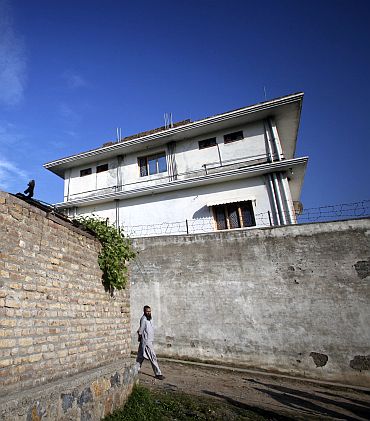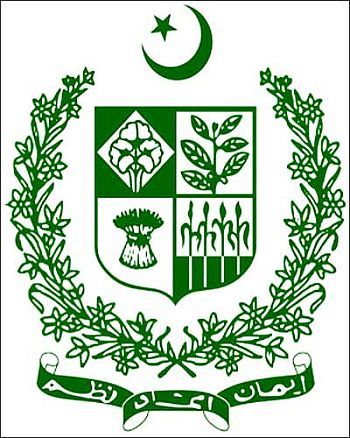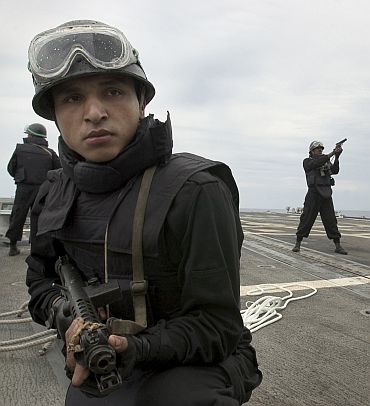Photographs: Faisal Mahmood/Reuters
Ties between the United States and Pakistan will soon be back to how they used to be before Osama bin Laden's killing. Knowing this, India should let a message radiate that we want peace with Pakistan, but we are prepared to act on our own in our own way and through our own capabilities should covert action on the ground become necessary, says security expert B Raman
At the worst, there was collusion between Pakistan's military-intelligence complex and Osama bin Laden which enabled him to live safely till May 1, 2011, at Abbotabad, the cradle of the Pakistan Army.
Coverage: US hunts down Osama bin Laden
At the best, the military-intelligence complex was aware of his presence in Abbotabad --possibly as a privileged and protected guest of Pakistani jihadi organisations such as the Lashkar-e-Tayiba and the Lashkar-e-Jhangvi -- and chose to close its eyes to it in order not to provoke OBL's jihadi allies in Pakistan.
No third explanation is available or possible for the fact of Osama having lived for many months or years in the cradle of the Army without any harm coming to him.
The US is disturbed. Even angry and has been posing tough questions to Pakistan as one could see from the media briefings of John Brennan, assistant to the President for Homeland Security, on May 2.
...
Tough questions are rarely followed by tough actions against Pak
No. And No. And No.
There is already an exercise on in the US State Department to respect the sensitivities of Pakistan, to spare it of any undue embarrassment and to avoid any punitive action against it.
Yes, tough questions are being asked. They will continue to be asked. Pakistan is embarrassed, but not unduly worried over these tough questions because it knows from the long history of its relationship with the US that tough questions are rarely followed by tough action against the State of Pakistan.
Little action, more pampering
Image: ISI emblemAs against Lt Gen Javed Nasir, the Director-General of the ISI, who was sacked in 1993 because of his alleged collusion with the Afghan Mujahideen.
As against Lt Gen Mahmood Ahmed, another DG of the ISI, sacked in 2001 because of his suspected collusion with the Afghan Taliban.
Nasir was sacked by Nawaz Sharif, the then Prime Minister. Ahmed was shifted out of the ISI by Gen Pervez Musharraf.
That is all. Once action was taken against senior officers of the ISI, US-Pakistan relations were back to their normal state of pampering.
Indians will find that they have become a sucker once again
History is going to repeat itself now after Osama's killing at Abbotabad. One or two senior officers of the Army and the ISI will be identified by the US as responsible for the collusion. The US will ask for their heads. Pakistan will happily offer their heads.
The State-to-State relations will be back to their sickening normalcy. The pampering of Pakistan will resume. The exercise to feed and fatten the Pakistani Army and intelligence will resume.
India and Indians, who are now gloating over the discomfiture of Pakistan, will find that they have become a sucker once again.
As we became in 1993 when Nasir's collusion with the Mujahideen was discovered. As we became in 2001 when Ahmed's collusion with the Afghan Taliban was discovered.
Our HUMINT capability is average
The dramatic US success was made possible by a dramatic improvement in the US HUMINT capability and by its spectacular covert action capability.
We have neither. Our HUMINT capability is average, but not extraordinary. Our covert action capability has been non-existent since 1997. Let us revamp both -- urgently and visibly.
Let our covert action capability be re-created
Let a message radiate from Delhi that we want peace with Pakistan, but we are prepared to act on our own in our own way and through our own capabilities should covert action on the ground become necessary.
Pakistan has been waging its terrorist campaign against India relentlessly because it knows we have neither the political will nor the covert action capability to retaliate.
Let the political will be born again which will make Indira Gandhi proud of us in high heaven. Let our covert action capability be re-created. To hell with what the world thinks of our actions.
I proudly contributed to the building up of India's covert action capability. I proudly headed it for some years till my retirement in August 1994. I cry every day when I see the way it has been wound up for 14 years now and our citizens continue to be slaughtered here, there and everywhere by the jihadi terrorists.
The writer is Additional Secretary (retd), Cabinet Secretariat, Govt of India







article